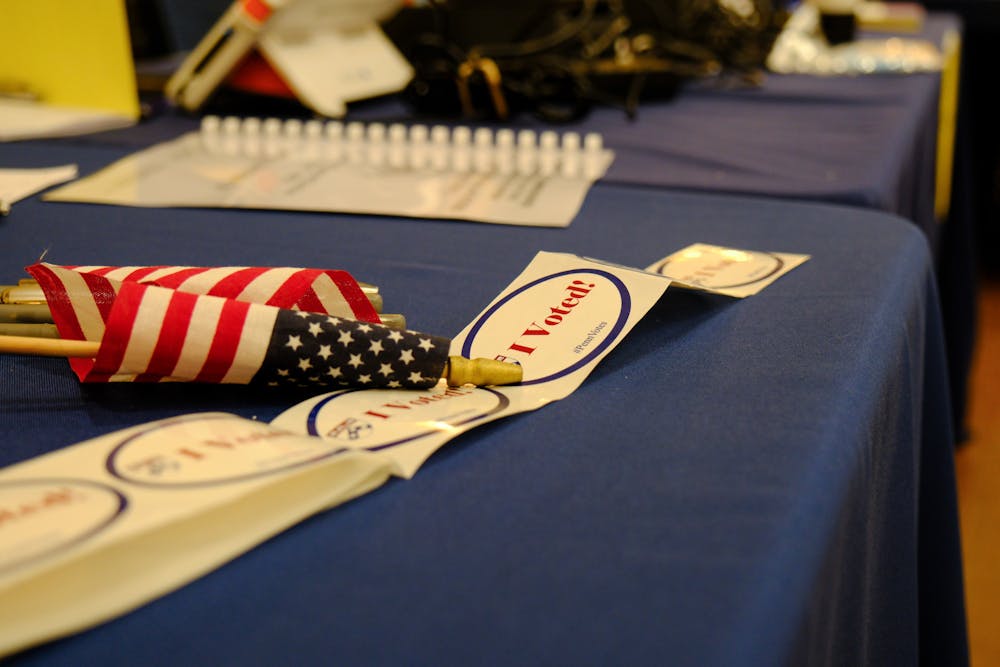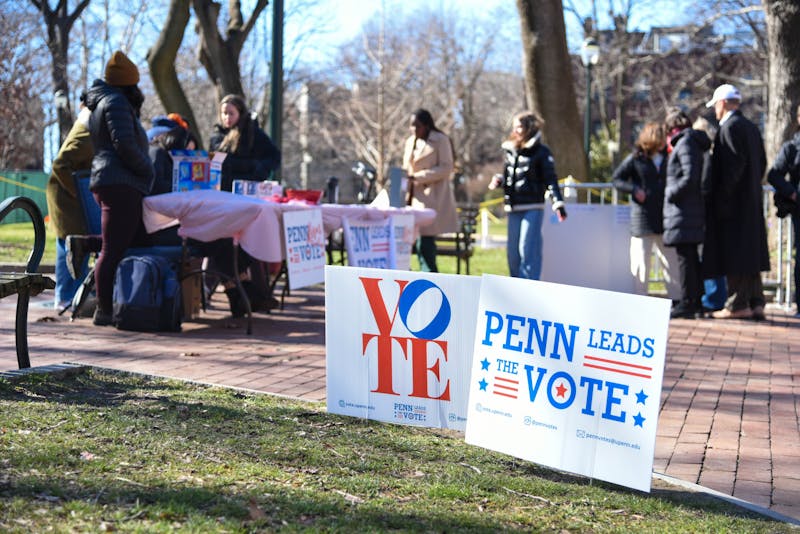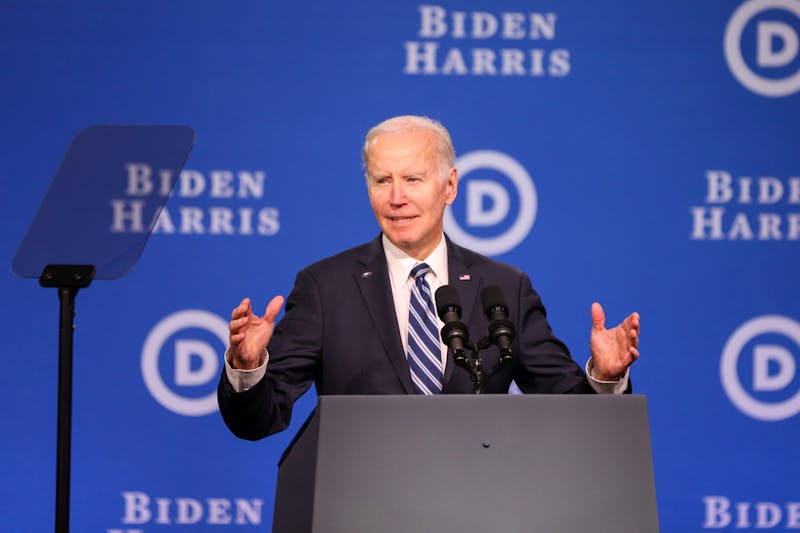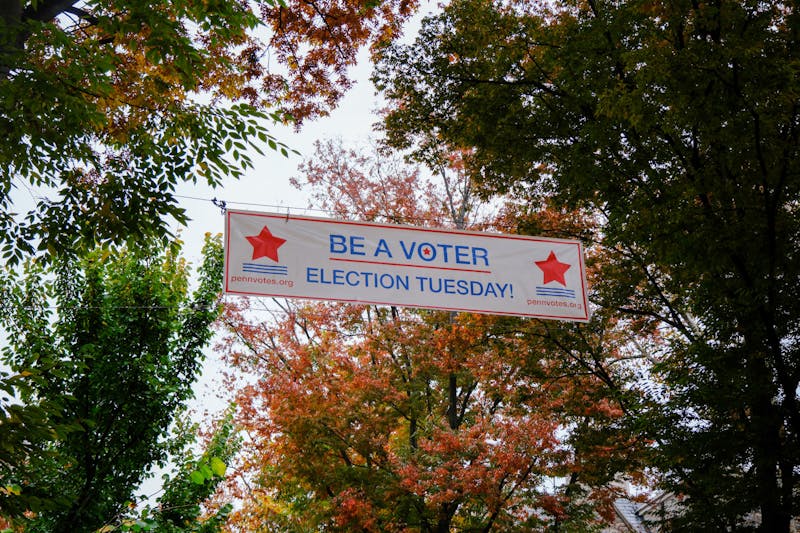
Pennsylvanians cast their votes in Tuesday’s primary election for the candidates who will represent each political party in November’s general election — with President Joe Biden’s victory on Penn’s campus marred by a substantial number of write-in votes.
From 7 a.m. to 8 p.m. on Election Day, 575 voters in the Penn community cast their ballots at three polling locations across campus. According to reporting done by The Daily Pennsylvanian, 411 ballots were cast in the two locations at Houston Hall and 164 were cast in the location at the ARCH building.
College first year Lucy Rupertus, a volunteer student poll worker who is also a staffer for the DP, noted that turnout for primary elections is usually lower in comparison to general elections. Despite this, Rupertus emphasized the importance of showing up to vote.
“I think people don't realize how many elections other than the president are on this ballot. There are a couple of other different just state and citywide positions being filled, and local government is equally as important as federal, so it's important to show out for those things as well,” Rupertus said.
Executive Director of Penn’s Office of Government and Community Affairs Dawn Maglicco Deitch attributed the low voter turnout in this year’s primaries to Pennsylvania’s primary election regulations.
Deitch told the DP that, in recent years, more Penn students have been choosing to remain unaffiliated with a party during voter registration events held at New Student Orientation and by Penn Leads the Vote.
Pennsylvania operates as a closed primary state, meaning voters must be registered with a political party to participate in the primary election. Unaffiliated or independent voters cannot take part in the primary, resulting in fewer registered voters on Penn’s campus participating in this election.
Biden, a former Benjamin Franklin Presidential Practice Professor at Penn, overwhelmingly won Pennsylvania’s presidential primary with the support of 93.1% of Democratic voters who cast their ballot for a listed candidate. Although Rep. Dean Phillips (D-Minn.) was on the ballot, he dropped out of the race in March.
Though Biden is the only candidate actively contesting the Democratic presidential primary, he only received 63.7% of the votes cast across the three polling locations on Penn’s campus. 28% of voters in the primary on Penn's campus chose to write in a candidate — an option encouraged by activists seeking to express opposition to Biden’s foreign policy in the Israel-Hamas war.
The Democratic Socialists of America held a campaign in Pennsylvania — called Uncommitted PA — to encourage voters registered with the Democratic Party to write-in “uncommitted” on their primary ballots. The organization tabled outside of ARCH and Houston Hall during Election Day, handing out flyers reading “Let Biden know Pennsylvania stands against genocide. Write-in “Uncommitted” for your presidential pick.”
College junior Alyssa Antonian, an organizer with PLTV, called the “Uncommitted” movement “a great way to make a statement.”
“I definitely think it's every student's right to advocate for however they want to vote and what values they look for when they're voting,” Antonian said.
1968 Wharton graduate and former President Donald Trump won Pennsylvania’s Republican presidential with 83.5% of the vote. Former South Carolina Gov. Nikki Haley also appeared on the Republican ticket, though she has also dropped out of the race.
Republican voters at the locations on Penn’s campus supported the former President in notably lower numbers, with 62.5% voting for Trump and 28.1% voting for Haley. Engineering sophomore Joseph Masica, who said he was a registered Republican, expressed disappointment that Trump was the only presidential candidate still in the running among Republicans.
“I felt like I had to [vote], even though I know on my primary [ballot] there's not many choices,” Masica said.
In the race for Pennsylvania senator, both major parties' primaries were uncontested — meaning that current Sen. Bob Casey (D-Pa.) will be facing off against Republican nominee Dave McCormick in the fall.
Incumbent Rep. Dwight Evans (D-Pa.) is a heavy favorite to retain his seat in the United States House of Representatives after winning 87.7% of the vote in his primary race. Voters on Penn’s campus were notably less supportive of the incumbent representative, with 33.33% voting for Evans’ challenger Tracey Gordon, who garnered only 12% of the state-wide vote. There was no candidate on the Republican ballot for this race.
In the highly contested Pennsylvania attorney general race, five Democrats and two Republicans vied for the party nominations. Eugene DePasquale won the Democratic race, winning 35.9% of voters’ support across the state, while Dave Sunday claimed the GOP nomination with 70.5% of the vote.
Among voters on Penn’s campus, however, Keir Bradford-Grey, Philadelphia’s former chief public defender, led the race with 47.4% of the vote. University of Pennsylvania Carey Law School lecturer Joe Khan came in second, garnering the support of 17.5% of Penn’s Democratic voters. DePasquale came fourth among campus voters, with only 11.9% of Democratic votes.
Democratic candidate Malcolm Kenyatta won against Mark Pinsley in the race for Pennsylvania auditor general with 64.1% of the vote. Kenyatta won 87.5% of votes at locations on Penn’s campus. Timothy DeFoor will appear on the general election ballot as the Republican nominee in November after running unopposed.
For Pennsylvania state treasurer, incumbent Stacy Garrity, as the sole candidate on the Republican ballot, won the GOP nomination. Democrat Erin McClelland won the Democratic primary with 54.4% of all votes. Among voters at Penn, McClelland lost to opponent Ryan Bizzarro, who received a recommendation from Penn Democrats, by 49 votes.
State Sen. Vincent Hughes (D-Philadelphia) was up for re-election during Tuesday's primary, but ran unopposed and will be facing no Republican challengers come November.
Incumbent Pennsylvania state Rep. Rick Krajewski — a 2013 Engineering graduate — won his primary for the 188th District. Tony Dphax King lost the nomination after winning only 17% of votes across the state. However, King received the disproportionate support of nearly 37% Democratic voters at Penn. No Republican candidates appeared on the ballot in this race.
Looking ahead to the general election, Deitch highlighted the importance of encouraging civic engagement across the Penn community, beyond just the student body. She noted the positive impact faculty and staff could have on youth turnout, particularly through demonstrated participation.
“Talking about voting, especially with young voters, helps raise that level of awareness, education, and intentionality to vote. So the more people model their interest in voting, their plans to vote, their rituals, their volunteer engagement, and things like that, that helps connect with our student community,” Deitch said.
Deitch predicted that voter turnout on campus will be much higher for the November general election and encouraged students to make their plans to vote early on.
Senior reporters Diamy Wang and Gretta Maguire contributed reporting to this article.
Editor’s note: The election results listed in this article are accurate as of the time of publication, 1:44 a.m. on April 24.
The Daily Pennsylvanian is an independent, student-run newspaper. Please consider making a donation to support the coverage that shapes the University. Your generosity ensures a future of strong journalism at Penn.
Donate











